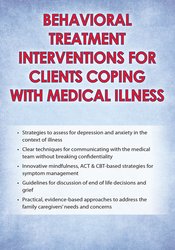

Heart Disease, Stroke, Diabetes, Cancer, COPD, Arthritis and the list goes on…
Chronic illness has become rampant across the United States and no doubt it has made its way into your office. Many chronic conditions require people to undergo demanding, debilitating treatment and make incredible lifestyle changes.
Treating these clients comes with the challenge of addressing ongoing medical stressors and the accompanying depression, anxiety, and quality of life concerns.
Teresa Deshields, Ph.D., ABPP, knows first-hand how difficult it can be to navigate these challenges – she knows that treating these vulnerable individuals is serious work that demands a thoughtful, organized, and dedicated approach.
Watch her as she shares 20 years of experience treating clients with chronic illness in this compelling, practical recording.
You’ll learn specific strategies to:
This cutting-edge training will take your practice to the next level!
| File type | File name | Number of pages | |
|---|---|---|---|
| Manual - Behavioral Treatment Interventions for Clients Coping with Medical Illness (1.6 MB) | 107 Pages | Available after Purchase |

Teresa L. Deshields, PhD, ABPP, is a licensed clinical psychologist and a board-certified health psychologist. She is adjunct professor of medicine and psychiatry & behavioral sciences at Rush University School of Medicine in Chicago. She is a Fellow of the American Psychological Association, as well as a Fellow of the American Psychosocial Oncology Society and its past president. She has worked for over 20 years as a clinician in psycho-oncology, treating cancer patients and survivors and their family members, throughout the cancer continuum. She has published over 50 peer-reviewed manuscripts, several invited papers, and a book on psychological treatment of cancer patients.
Speaker Disclosures:
Financial: Dr. Teresa Deshields has an employment relationship with Rush University Medical Center and receives royalties as a published author. She is a consultant with AstraZeneca and R3 Continuum. Dr. Deshields receives a grant from the American Cancer Society. She receives a speaking honorarium and recording royalties from PESI, Inc. All relevant financial relationships with ineligible organizations have been mitigated.
Non-financial: Dr. Teresa Deshields is a member of the American Psychological Association, the Society for Health Psychology, and the American Psychosocial Oncology Society.
Establishing Whole Person Care
Psychological Distress in the Medically Ill
Behavioural Interventions for Physical Symptom Management
End of Life Considerations
Communication Issues
Family Caregivers
Please wait ...